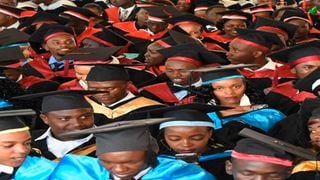
University graduation ceremony.
| File | Nation Media GroupNews
Premium
TSC backs down on plan to kill Bachelor of Education degree
What you need to know:
- Since information went out about the proposal, there has been heated debated from stakeholders in the education sector.
- It also caused anxiety among trained but jobless teachers that they could be locked out of employment
The Teachers Service Commission appears to have backed down from its earlier recommendation to scrap the Bachelor of Education (B.Ed) degree programme from September this year.
The commission, in a presentation to deans of schools of education in universities, had recommended that teacher trainees undertake either a three-year Bachelor of Arts (BA) or Bachelor of Science (B.Sc) degree, study three teaching subjects and later study for a post-graduate diploma in education. Currently, B.Ed students specialise in two teaching subjects in addition to education units studied from the first year.
Since information went out about the proposal, there has been heated debated from stakeholders in the education sector. It also caused anxiety among trained but jobless teachers that they could be locked out of employment. Education Cabinet Secretary George Magoha has already supported the recommendation to change teacher training.
However, the TSC Chief Executive Officer Nancy Macharia now says that a decision has not been made yet and that if changes to teacher training will be effected, they will not disadvantage past or present holders of the B.Ed degree.
No powers to scrap any degree
“I wish to assure all stakeholders that the TSC has no powers to scrap any university degree. The role of determining degrees to be offered in universities is the sole prerogative of university senates, which are in charge of academic programmes under the regulation of the Commission for University Education. The TSC’s mandate is limited to reviewing and advising on the standards of education and training of persons entering the teaching service in Kenya,” Ms Macharia said on Tuesday during the Form One selection launch at the Kenya Institute of Curriculum Development.
She added that the mandate of the TSC is limited to reviewing and advising on the standards of education and training of persons entering the teaching service in Kenya. Ms Macharia explained that the new entry grades for teachers had originated from a report by a task force on the implementation of the competence based curriculum (CBC).
“Such reforms will be implemented in a methodical, systematic and phased manner that will not disadvantage any past or present graduate of a valid education degree. A date of implementation will clearly be spelt out in a manner that will ensure a seamless transition from the 8-4-4 education system to the new CBC,” Ms Macharia said.
However, the recommendations contained in a document titled, Framework on Entry Requirements in the Teaching Service, prepared by the director, Quality Assurance and Standards, Dr Reuben Nthamburi, even have timelines for implementation.
“It is proposed that the above be used as a basis for admission into teacher education... from September 2020,” it reads.
Recommendations strongly opposed
The Nation understands that deans of schools of education from 56 universities offering the B.Ed programme are finalising a joint response to the TSC proposal.
Last week, Kenyatta University VC Paul Wainaina strongly opposed the TSC recommendations. In a response he presented to the Inter-Public University Council Consultative Forum and seen by the Nation, he pokes holes into the plan to do away with the degree course, which has been taught in Kenyan universities since 1970. KU is the main trainer of secondary school teachers in the country.
The Ministry of Education last year phased out the training of certificate in primary teacher education (P1) and replaced it with a diploma in primary teacher education. The first intake was done last month, even though it attracted few applicants since most students did not meet the new entry requirements.
Ms Macharia announced that TSC would advertise teaching jobs from next month, after the commission was allocated Sh2.5 billion for the recruitment of 5,000 teachers in the next financial year. 6,000 intern teachers will also be recruited at a cost of Sh1.2 billion.





